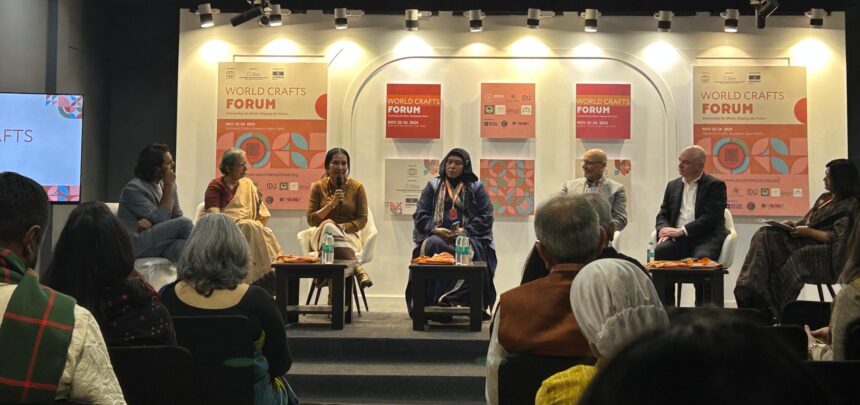Elevating Kashmiri Crafts: A Global Perspective
The recent celebrations surrounding the World Craft Council (WCC) in Srinagar have brought significant attention to the rich craftsmanship of Jammu and Kashmir, highlighting its historical and cultural importance. With the introduction of a Seal of Authenticity for local crafts and the recognition of Srinagar as a World Craft City, these developments mark a pivotal moment for artisans in the region. This article delves into the implications of these initiatives, the historical context of Kashmiri crafts, and the potential for future growth.
The World Craft Council’s Initiatives
At the WCC’s 60th anniversary celebrations held in Srinagar from November 25 to 27, 2024, WCC President Saad Al-Qaddumi announced plans to introduce a Seal of Authenticity for handmade crafts from Jammu and Kashmir. This initiative aims to provide globally recognized certification, enhancing quality assurance and ownership among artisans, particularly in the textile sector. Al-Qaddumi emphasized that this program is designed to support local artisans in achieving international recognition and market access.
During the celebrations, an agreement was signed between the WCC and the Jammu and Kashmir government to establish a World Craft Hub and an International Crafts Museum in Srinagar. These institutions are intended to serve as focal points for innovation and collaboration, positioning Srinagar as a global center for artisanal excellence.
Historical Significance of Kashmiri Crafts
Kashmir has a long-standing tradition of craftsmanship that dates back centuries. The region has been historically recognized for its exquisite Pashmina shawls, intricate carpets and unique papier-mâché art. The craftsmanship in Kashmir is not merely about utility but is deeply intertwined with cultural identity of its people. Srinagar’s designation as a World Craft City is a testament to this rich heritage, recognizing its contribution to global artistry.
According to reports by the Indian National Trust for Art and Cultural Heritage (INTACH), Kashmir’s craft traditions have been influenced by various cultures due to its historical position on trade routes like Silk Road. This has resulted in a unique fusion of styles and techniques that continue to inspire contemporary artisans. The INTACH report highlights that Srinagar is home to over 20,000 craftsmen, contributing significantly to the region’s economy through handicrafts valued at approximately ₹2,650 crore in 2023.
Empowering Local Artisans
The recent initiatives by the WCC and the J&K government are seen as crucial steps towards empowering local artisans. Many artisans have expressed optimism about these developments. Mushtaq Ahmad, a local craftsman, noted that recognition as a World Craft City would enhance global awareness of Kashmiri arts and crafts. He also pointed out that governmental efforts such as Geographical Indication (GI) tagging have already revitalized many traditional crafts.
The introduction of programs aimed at skill development and financial assistance is expected to further uplift the artisan community. The J&K government has implemented various policies aimed at strengthening the craft sector, including initiatives under the Wool Processing, Handloom and Handicrafts Policy-2020. These efforts are crucial not only for preserving traditional skills but also for creating sustainable livelihoods for artisans.
Future Prospects
The WCC’s commitment to fostering international collaboration presents an opportunity for Kashmiri crafts to gain visibility on a global scale. By connecting local artisans with international markets and promoting their unique products, there is potential for significant economic growth within the region.
Moreover, establishing a craft museum will serve as an educational hub where both locals and tourists can learn about Kashmir’s rich crafting history. This initiative aligns with broader goals of integrating crafts into tourism, thereby enhancing visitor experiences while supporting local economies.
Conclusion
The recent developments surrounding Kashmiri craftsmanship signify a transformative period for the artisans in Jammu and Kashmir. With initiatives like the Seal of Authenticity and recognition as a World Craft City, there is renewed hope for preserving traditional skills while fostering economic growth. As these efforts unfold, they promise not only to elevate Kashmiri crafts on the global stage but also to ensure that this rich cultural heritage continues to thrive for generations to come.
- Jammu and Kashmir Leads India in Forest Health and Productivity
- Gulmarg’s Ecological Preservation: A Strategic Vision for Sustainable Tourism
- Jammu and Kashmir: A Region in Environmental Distress – Rainfall Deficit and Extreme Cold Wave
- Five Terrorists Neutralized in Fierce Kulgam Encounter: Comprehensive Report
- Srinagar’s Electric Bus Revolution: A Comprehensive Overview







